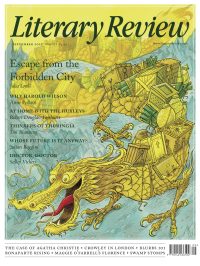Norma Clarke
Sulphur & Sensibility
Murky Waters: British Spas in Eighteenth-Century Medicine and Literature
By Sophie Vasset
Manchester University Press 304pp £85
Tobias Smollett, non-practising doctor and novelist, took a dim view of spas. The mineral waters of Harrogate, smelling of rotten eggs, were ‘salt water putrified in the bowels of the earth’. Matthew Bramble in The Expedition of Humphry Clinker has to hold his nose while drinking his one glass. Only one: the effect was ‘sickness, griping, and insurmountable disgust – I can hardly mention it without puking’. In Murky Waters, Sophie Vasset concedes that treatments at spa towns like Bristol, Bath, Scarborough, Buxton, Harrogate, Cheltenham and Tunbridge Wells were ‘at best, disagreeable, often an ordeal’ and ‘anything but relaxing’. Still, they were hugely popular throughout the 18th century; the surprising thing is how few medicinal spas survive in Britain when many in France and Germany continue to thrive.
The waters drew the sick. They came looking for relief from chronic diseases: rheumatism, gout, palsy, syphilis, cancer. Nervous conditions like melancholy or hypochondria were understood in relation to physical symptoms, particularly stomach and bowel complaints, for which a season at a spa was recommended. Part of the cure might lie in animated sociability – in musical events, theatre, walks and talks – while part of the appeal could be getting away from home. The poet William Hayley’s wife, Eliza, preferred life in Bath, where she made friends with Edward Gibbon, to fractious domesticity with her husband in Sussex. He grumbled at the cost but paid up; while she took the waters, he spent time with his housekeeper/mistress.
Pleasure and sickness, leisure and care existed in uneasy tension in spa towns. Vasset wants us to take the medical aspect seriously. Doctors debated the relative merits of hot baths and cold baths, of chalybeate springs (containing iron salts) and sulphur wells. Like any medicine, mineral waters had to

Sign Up to our newsletter
Receive free articles, highlights from the archive, news, details of prizes, and much more.@Lit_Review
Follow Literary Review on Twitter
Twitter Feed
Though Jean-Michel Basquiat was a sensation in his lifetime, it was thirty years after his death that one of his pieces fetched a record price of $110.5 million.
Stephen Smith explores the artist's starry afterlife.
Stephen Smith - Paint Fast, Die Young
Stephen Smith: Paint Fast, Die Young - Jean-Michel Basquiat: The Making of an Icon by Doug Woodham
literaryreview.co.uk
15th-century news transmission was a slow business, reliant on horses and ships. As the centuries passed, though, mass newspapers and faster transport sped things up.
John Adamson examines how this evolution changed Europe.
John Adamson - Hold the Front Page
John Adamson: Hold the Front Page - The Great Exchange: Making the News in Early Modern Europe by Joad Raymond Wren
literaryreview.co.uk
"Every page of "Killing the Dead" bursts with fresh insights and deliciously gory details. And, like all the best vampires, it’ll come back to haunt you long after you think you’re done."
✍️My review of John Blair's new book for @Lit_Review
Alexander Lee - Dead Men Walking
Alexander Lee: Dead Men Walking - Killing the Dead: Vampire Epidemics from Mesopotamia to the New World by John Blair
literaryreview.co.uk